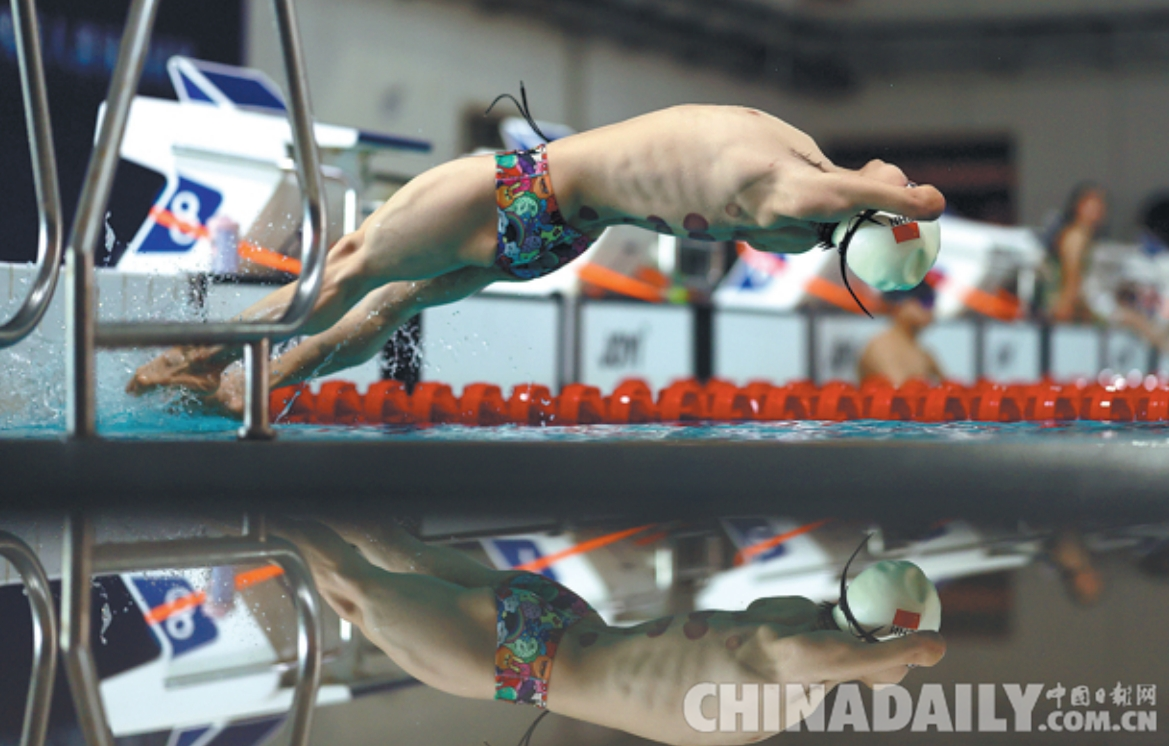
 0 Comment(s)
0 Comment(s) Print
Print E-mail China Daily, August 28, 2024
E-mail China Daily, August 28, 2024
As one of China's flagship teams at the Paralympics, the swimming squad has wasted no time in adjusting to the rigors of competition in Paris. Having battled long flights and jet lag, the team is now settling in, readying itself for the upcoming games.

The Chinese swimmers are set to continue to make big splashes during the Paris Paralympics. WEI XIAOHAO/CHINA DAILY
Set to take place from Aug 29 to Sept 7 at the Paris La Defense Arena, the swimming competition will see China field 46 athletes — 21 men and 25 women — making the team the second-largest contingent after athletics.
Wei Wei, a staff member on China's Paralympic swimming team, said that the team, along with the second batch of the Chinese delegation, arrived at the Paralympic Village in Paris on the evening of Aug 21.
Despite the long-haul flight and having to adjust to the time difference, the athletes have quickly acclimated, and the team is in good overall shape as the athletes prepare for competition.
At the Tokyo Paralympics, China's swimming team delivered a remarkable performance, taking home 19 golds, 19 silvers, and 18 bronze medals. These achievements have heightened expectations for their showing in Paris.
However, Wei noted that, this time around, the team faces greater challenges. Beyond climate, diet and time zone adjustments, classification changes have increased the difficulty for some of the Tokyo gold medalists to defend their titles.
The Chinese swimmers are slated to compete in more than 80 events at the Paris Paralympics. Despite the increased challenges, the team remains determined to overcome obstacles and deliver a strong performance, Wei said.
Veteran swimmer Lu Dong, known as the "armless mermaid", has competed in several Paralympic Games, including London, Rio, and Tokyo, and has won multiple gold medals.
"Having competed internationally so often, I've quickly adjusted to the time difference," Lu said. "I just finished a training session at the gym. Since my events are still a bit of time away, I hope to be in peak condition when the competition starts."
Before coming to Paris, Lu treated herself to a special pedicure. The designs on her toenails include the Paralympic logo, the Chinese flag, and a gold medal — along with blue representing the color of water.
"I hope to deliver my best swim this time and show even more progress than before," she said.
The youngest athlete on Team China, 15-year-old swimmer Jiang Hui, will compete in six events. She began training the day after her arrival in Paris, spending up to five hours a day in the pool. Competing in her first Paralympic Games, Jiang hopes to surpass her personal best.
"I don't have much experience in international competitions, and with so many events, my coach just wants me to learn from the experience," Jiang said. She recalled feeling overjoyed and excited when she found out she would be representing China at the Paralympics, immediately sharing the news with her family and friends.
The Chinese team includes both emerging talents like Jiang and seasoned veterans. Tokyo Paralympic gold medalist Jia Hongguang, who only became a swimmer at the age of 21, will compete in his fourth Paralympic Games in Paris.
At 36, Jia acknowledges this may be his final Games and hopes to finish his journey with a strong performance.
Now working in disability-related fields, Jia expressed his desire to inspire more people with disabilities to fully embrace life through his efforts and achievements.
Since preparing for the Hangzhou Asian Para Games last year, the Chinese swimming team has been working on a comprehensive training plan in sync with the upcoming Paris Paralympics.
According to Wei, a scientific research team has been closely involved with the swimmers, assisting with physiological and biochemical testing, physical conditioning and psychological support.
During winter training, a special underwater technical analysis was conducted to ensure the athletes' techniques meet the required standards, providing valuable feedback for the coaches.
In June, the 2024 National Disabled Swimming Invitational Competition was held in Beijing. It served as both a training session, and an opportunity for the athletes to fine-tune their competitive readiness for the Paris Games.